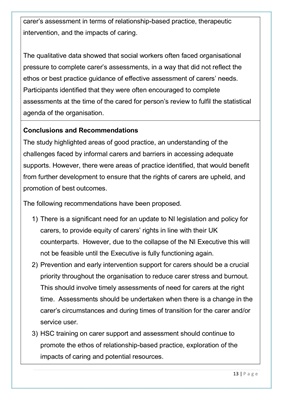
13 | P a g e
carer's assessment in terms of relationship-based practice, therapeutic
intervention, and the impacts of caring.
The qualitative data showed that social workers often faced organisational
pressure to complete carer's assessments, in a way that did not reflect the
ethos or best practice guidance of effective assessment of carers' needs.
Participants identified that they were often encouraged to complete
assessments at the time of the cared for person's review to fulfil the statistical
agenda of the organisation.
Conclusions and Recommendations
The study highlighted areas of good practice, an understanding of the
challenges faced by informal carers and barriers in accessing adequate
supports. However, there were areas of practice identified, that would benefit
from further development to ensure that the rights of carers are upheld, and
promotion of best outcomes.
The following recommendations have been proposed.
1) There is a significant need for an update to NI legislation and policy for
carers, to provide equity of carers' rights in line with their UK
counterparts. However, due to the collapse of the NI Executive this will
not be feasible until the Executive is fully functioning again.
2) Prevention and early intervention support for carers should be a crucial
priority throughout the organisation to reduce carer stress and burnout.
This should involve timely assessments of need for carers at the right
time. Assessments should be undertaken when there is a change in the
carer's circumstances and during times of transition for the carer and/or
service user.
3) HSC training on carer support and assessment should continue to
promote the ethos of relationship-based practice, exploration of the
impacts of caring and potential resources.